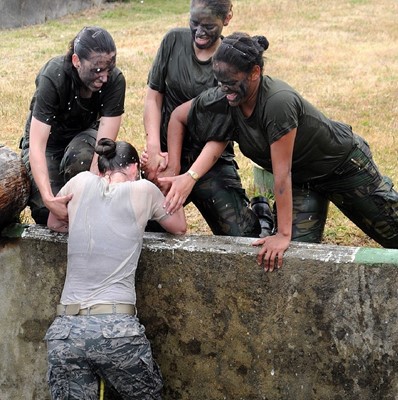
Golf fans know: Even the great Tiger Woods couldn't modify his golf swing overnight.
Yet, when we suggest a speaker add a new dimension to their tried-and-true presentation style, they become frustrated when the change doesn't snap into place immediately.
And it's not uncommon for a skilled speaker to become discombobulated when trying to do something new.
How can we learn new skills more quickly and with less emotional trauma?
Veterans and members of the military who've attended our programs have given us some insights into how anyone can learn a new skill more quickly.
Here's what they do (and don't do) that might help you:
Don't reject a suggestion before you give it a try.
Convincing a stern speaker they need to lighten up can be tough. So can persuading an introverted speaker to be a little louder and larger.
A response Buckley coaches hear a lot: That's just not me.
Of course, we want you to be yourself. But when we're unwilling to try just because we feel a little goofy with something new or different, we limit our ability to improve.
Members of the military, though, will try - even when it's clear the new approach feels awkward for them. We're not big fans of talking about the old "comfort zone" but it's a clear advantage when you're willing to leave yours.
Don't waste time justifying the old way you've done it.
You might believe there's a valid reason you pace the room restlessly, end every observation with "right?" or insist on using sesquipedalian words.
Defending the old way you do something slows your ability to make room for the new. Our students from the military branches seem to realize you don't have to reject a lifetime of experience to give a fresh technique a try.
And if you watch them learn, you'll see how you can make progress more quickly when you embrace the instruction without dwelling on the past.
Embrace the struggle and don't get discouraged.
No one expects their teenager to sit behind the wheel of a car and master driving in the first 30 minutes. Why, then, do we expect to nail a new public speaking technique on the first try?
Most Buckley School students from the military are more comfortable with the struggle, despite having high standards for themselves. Because they don't get down on themselves while learning, they make progress more quickly.
And we've noticed they're also quick to support and encourage classmates who are grappling with new skills.
 Comfortable with the struggle, supporting classmates, and being willing to fail before they succeed are qualities that make our public speaking students from the military such quick learners.
Comfortable with the struggle, supporting classmates, and being willing to fail before they succeed are qualities that make our public speaking students from the military such quick learners.
Learning quickly because the stakes are high
Service members in our classes have told us before:
"You don’t get very far if you can’t learn how to do things in new ways."
"Learning new skills is part of the job."
"I don’t want to sound dramatic, but being able to get something quickly can be a matter of life and death for us."
The ability to learn is critical to the work they do, and we've noticed they bring this same mentality to our Buckley School programs.
And we've seen them take on public speaking despite a reservation that may surprise you. Even though these women and men have deployed for combat, jumped out of planes, and faced other tests we civilians can only imagine, they still battle nerves when faced with public speaking.
Their advantage is that they don't let perfectionism or fears of failing keep them from pressing ahead and improving as quickly as possible.






